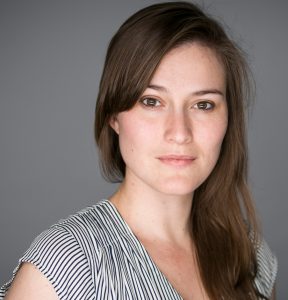Rollenwechsel im Dokumentarfilm
von Lisa Gerig mit Living Smile Vidya
In meinem Film Die Anhörung (2023) wird eine Situation beleuchtet, die der Öffentlichkeit normalerweise verborgen bleibt: die Asylanhörung – das zentrale Element jedes Asylverfahrens, in dem über das Schicksal asylsuchender Menschen entschieden wird.
Für den Film haben wir das gesamte Anhörungssetting nachgestellt. Die Protagonist:innen tauchen einerseits erneut in die Welt ihrer eigenen Erfahrungen ein und übernehmen andererseits ebenso die Perspektive ihres Gegenübers: Die/der Befragte wird zur/zum Befragenden und umgekehrt.
Mit diesem Referat möchte ich Einblick in die vielschichtigen Prozesse hinter diesem Film geben: Warum haben wir uns für diesen neu geschaffenen Rahmen entschieden? Was hat dieser ermöglicht, was wurde erschwert? Welche Vorbereitungen waren nötig, um den Dreh für alle Beteiligten zumutbar, ja sogar bereichernd zu gestalten? Wie beeinflusste das nachgestellte Setting die Dynamik von Macht und Rollenzuschreibungen? Und warum entschieden sich die Protagonist:innen, sich erneut in eine so herausfordernde Befragungssituation zu begeben?
Zusammen mit meinen Protagonist:innen werfen wir einen Blick auf die künstlerischen Entscheidungen und die zwischenmenschliche Begleitung während des gesamten Prozesses – von der Vorbereitung bis zur Auswertung des Films.
__
Film:
> DIE ANHÖRUNG (2023)
CVs:
> Lisa Gerig
> Living Smile Vidya
